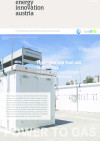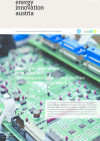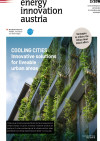Suchergebnisse für "Factsheet: Energietechnologien gestalten, die für alle sinnvoll und nutzbar sind"
Hydrogen and fuel cell technology

in the energy and transport systems of the future
energy innovation austria
2/2015
Herausgeber: BMVIT und Klima- und Energiefonds
Englisch, 8 Seiten
Downloads zur Publikation
VITALITY District - Optimized energy concepts in the early planning phase of resilient, energy-efficient neighbourhoods
The aim of the VITALITY District project is to coordinate the total (electrical and thermal) load and generation profile in the design phase of urban areas and neighbourhoods in order to optimize the energy concept of energy-efficient districts. Hence smart city indicators in detailed level (buildings, individual technologies, public spaces) as well as models, principles and catalogs of criteria for energy-optimized urban neighbourhoods were created. The results were presented in compact form on the district level in order to serve as input for future urban planning projects.
digiactiv - digital transformation for more interactivity in MEP-(mechanical, electrical and plumbing-)planning
The aim of the digiactiv project was to improve the interoperability between the different stakeholders in the building construction sector using open and neutral semantic data models. With digital transformation processes, digiactiv helps to increase the quality of planning and the operation of buildings, as well as to minimize the interface risk between various stakeholders.
Transfer initiative - The future belongs to the passive house

Developing the passive house standard from pilot projects to a common standard in housing projects with an optimum of comfort. Comprehensive transfer initiative of the passive house standard by fairs, exhibitions and lobbying activities in communities.
ZSG - Sustainable Concepts in urban redevelopment and building refurbishment

Project on research and implementation for ecological and energy efficient concepts, urban redevelopment and building refurbishment. Performance of a routing project on a former ter-ritory of the Austrian armed forces in Steyr.
ZERMEG III - Decision guidance for the visualisation of the achievements of sustainable corporate strategies
ZERMEG III creates a virtual factory of the future from the combination of the research results of different projects. This model will be used to generate real experience for managers in experimenting taking organisational and technical decisions with regard to a sustainable development.
ECC – EnergyCityConcepts – Development of a methodology and concept for the implementation of sustainable energy systems in cities by the example of Gleisdorf and Salzburg
In the context of this project two concrete model regions (small city Gleisdorf and urban city quarter Salzburg-Schallmoos) will be developed and tested with new methodical approaches (interdisciplinary urban and regional energy planning, modeling and simulation). An ambitious political commitment of both model regions is a 100% renewable or rather CO2-neutral energy supply.
IEA-PVPS Task 13: Performance, Operation and Reliability of Photovoltaic Systems (Working period 2018 - 2021)
The IEA Task 13 develops independent, internationally valid analyses and recommendations for the operation and reliability of PV systems and their components. The continuation of the Austrian participation ensures the flow of information back to the Austrian photovoltaic industry through international cooperation and strengthens Austria as a location for innovation and production.
"gugler! build & print triple zero" - subproject 5: Ecoeffective building
On the basis of the commercial building gugler with 2140 m² useable floor area existing and 3260 m² useable floor area to be built a concept for a 100% recyclable ecoeffective building will be developed.
IEA EV Task 52: EVs and Circularity
Electric vehicles have specific challenges to reach circularity, which must be identified and solved adequately. Circularity issues are relevant in all phases of the life cycle – production, use and end of life – so circularity is strongly linked to Life Cycle Assessment (LCA) of electric vehicles. Austria leads this task and is responsible for the scientific assessment of circularity in LCA. Relevant case studies for the Austrian industry are analysed and the national R&D demand is identified.
IEA SHC Task 51: Solar Energy in Urban Planning
The focus of IEA SHC Task 51 ‚Solar Energy in Urban Planning’ has been placed on the topic of solar energy integration in urban environment. Hereby, different international examples, options and processes for planning and implementation of solar energy measures in cities throughout the world have been screened, outlined and equipped with recommendations for further development. The core outcomes of the project address different options and possibilities for optimization of planning processes, framework conditions, tools, methods and education aiming to attain more effective and timely understanding as well as integration of solar energy in urban context.
IEA Bioenergy Task 40 Newsletter: Halbjahresbericht Juni 2020 - Jänner 2021 (2/2021)

Halbjährlicher Newsletter des IEA Bioenergy Task 40: Bereitstellung biobasierter Wertschöpfungsketten
Herausgeber: IEA Bioenergy Task 40
Englisch, 4 Seiten
Downloads zur Publikation
Smart grid innovations from Austria

New components and storage facilities for tomorrow‘s energy supply system.
energy innovation austria
2/2018
Herausgeber: BMVIT und Klima- und Energiefonds
Englisch, 8 Seiten
Downloads zur Publikation
BIM2BEM Flow - Continuous BIM-based energy efficient planning
Automated integration and assignment of exchange requirements between the design and simulation programs, based on the elaborated exchange information requirements, should enable continuous energy efficiency planning along the design phase.
Measures for Minimisation of Rebound-Effects Concerning Residential Building Renovation (MARESI)

Development of a pragmatic assessment scheme applicable to building practice for the impact of building products on human health
ECR Energy City Graz-Reininghaus: Urban strategies for the new conception, construction, operation and restructuring of an energy self-sufficient city district
The aim is the development of a valid set of specific values and a guideline as a basis for energy self-sufficient district development. Based on the results, a masterplan (energy-network) for the district Graz-Reininghaus shall be developed. Future-oriented "city-building-blocks" will be implemented as flagships of innovation.
Itz Smart – Carbon neutral city district development Itzling – Implementing innovation and technology via co-operative process design
The goal of the project “Itz Smart” is to tie in with existing activities and to consistently develop Itzling as a residential location further. In the test and demonstration area, sustainable residential quarters with trendsetting solutions for mobility are developed in the zone of the transport axis (railway and Schillerstraße) and along the local supply axis (Itzlinger Hauptstraße). The consideration of housing and mobility with regard to the aspect of “city of short ways“ also entails a discussion of determined mixed utilisation and the development of such residential quarters.
Systemic renovation in the social housingsector

This project treats a global renovation of a residential estate built in the 1960s in the context of council housing in a laggard region. The point is to optimise with a systemic approach in a interdisciplinary team all partitions which include habitation.
Cooling Citites

Innovative solutions for liveable urban areas
energy innovation austria
2/2019
Herausgeber: BMVIT und Klima- und Energiefonds
Englisch, 12 Seiten
Downloads zur Publikation
Webinar Balanced Heating & Cooling with Radiative Surfaces: Resilient answers to upcoming cooling needs, with new questions for the Comfort Community (2020)

Webinar zum Thema Resilient Ventilative Cooling in der Praxis
Herausgeber: INIVE EEIG – International Network for Information on Ventilation and Energy Performance
Englisch
